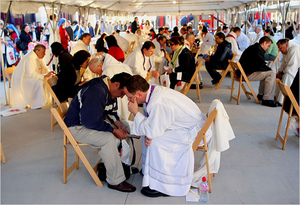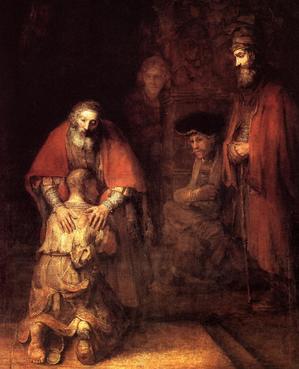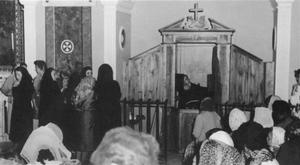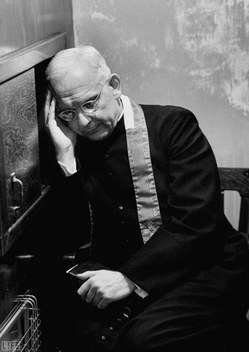“As confessors we are called to show mercy and
hope, to be fathers more than judges, to take on the penitent’s pain and listen
with much patience,” Cardinal Raymond Burke told CNS correspondent Carol Glatz.
Tag: confession
Examination of Conscience for priests
 The Congregation for Clergy published an examination of conscience entitled “The Priest, Minister of Divine Mercy: An Aid for Confessors and Spiritual Directors” which hopes to reinvigorate the priest’s spiritual paternity by a recovery of the sacrament of Confession by penitent and confessor. Here is yet another aspect of the new evangelization called for by Blessed John Paul II and now Pope Benedict: the renewal of priests and people through Reconciliation.
The Congregation for Clergy published an examination of conscience entitled “The Priest, Minister of Divine Mercy: An Aid for Confessors and Spiritual Directors” which hopes to reinvigorate the priest’s spiritual paternity by a recovery of the sacrament of Confession by penitent and confessor. Here is yet another aspect of the new evangelization called for by Blessed John Paul II and now Pope Benedict: the renewal of priests and people through Reconciliation.
“The Priest, Minister of Divine Mercy” is the fruit of Pope Benedict’s Year for Priests. As Cardinal Piacenza notes, this “is a measure of authentic faith in the saving action of God which shows itself more clearly in the power of grace than in human strategic or pastoral initiatives which sometimes overlook this essential truth.” A sobering statement for one who works in a parish.
On the surface it seems that this text is exclusively for the clergy. Don’t be fooled into putting it aside. I would recommend it to the laity as well. Be acquainted to the sacrament of Confession, the theology and practice of the Church and what the Church expects of her clergy. We have to help each other see Christ’s work among through concrete manifestation of Divine Mercy.
Consider the ideas found in the introduction (the link to the full text is at the end):
“It is necessary to return to the confessional as a place in which to celebrate the Sacrament of Reconciliation, but also as a place in which “to dwell” more often, so that the faithful may and compassion, advice and comfort, feel that they are loved and understood by God and experience the presence of Divine Mercy beside the Real Presence in the Eucharist”.
With these words, the Holy Father Pope Benedict XVI addressed confessors during the recent Year for Priests, indicating to each one present the importance and therefore the apostolic urgency of rediscovering the Sacrament of Reconciliation, both from their viewpoint of penitents as well as that of ministers. Along with the daily celebration of the Eucharist, the availability of the priest to hear sacramental confessions, to welcome penitents, and to accompany them spiritually when they so request, is the real measure of a priest’s pastoral charity. By their availability, priests give joyful witness and in a certain sense take upon themselves their true identity, redefined in the Sacrament of Holy Orders and not reducible to a mere functionality. The priest is a minister, which is to say that he is at the same time both a servant and a prudent dispenser of Divine Mercy. To him is entrusted the serious responsibility “to forgive or to retain sins” (cf. John 20: 23).
Through him, and through the power of the Spirit who is the Lord and Giver of Life, the faithful are able to experience today in the Church the joy of the Prodigal Son, who after a life of sin returned to his father’s house in the manner of a servant but was welcomed with the dignity of a son. Whenever a confessor is available, sooner or later a penitent will arrive. And if the confessor continues to make himself available, even stubbornly so, sooner or later many penitents will arrive! Our rediscovery of the Sacrament of Reconciliation, both as penitents and as ministers, is a measure of authentic faith in the saving action of God which shows itself more clearly in the power of grace than in human strategic or pastoral initiatives which sometimes overlook this essential truth.
Responding to the appeal of the Holy Father and expressing his profound intent, this aid is intended as yet another fruit of the Year for Priests, to be a helpful instrument for the ongoing formation of the Clergy and an aid in rediscovering the indispensible value of the Sacrament of Reconciliation and of Spiritual Direction. The new evangelization and the ongoing renewal of the Church, semper reformanda, draw their life blood from the true sanctification of each member of the Church. It is clear that sanctifi cation must precede both evangelization and renewal, for it lays claim to and forms the necessary precondition for every effective apostolic effort, as well as for the reform of the Clergy.
In the generous celebration of the Sacrament of Divine Mercy, each priest is called to experience for himself the uniqueness and the indispensability of the ministry entrusted to him. Such an experience will help him to avoid the “ever-changing sense of identity” which so often marks the existence of some priests. Instead, his experience will cultivate within himself that sense of wonder which fi lls his heart, for through no merit of his own he is called by God, in the Church, to break the Eucharistic Bread and to forgive the sins of others.
Here’s “The Priest, Minister of Divine Mercy: An Aid for Confessors and spiritual Directors”: Examination of Conscience for confessors and spiritual directors.pdf
Divine Mercy: known in peaceful embrace of sacramental forgiveness
“I am the Lord who acts with mercy” (Jeremiah 9,23)
Pio was a generous dispenser of divine mercy, making himself available to all
by welcoming them, by spiritual direction and, especially, by the
administration of the sacrament of Penance. I also had the privilege, during my
young years, of benefiting from his availability for penitents. The ministry of
the confessional, which is one of the distinctive traits of his apostolate,
attracted great crowds of the faithful to the monastery of San Giovanni Rotondo.
Even when that unusual confessor treated pilgrims with apparent severity, the
latter, becoming conscious of the gravity of sins and sincerely repentant,
almost always came back for the peaceful embrace of sacramental forgiveness.
May his example encourage priests to carry out with joy and zeal this ministry
which is so important today, as I wished to confirm this year in the Letter to
Priests on the occasion of Holy Thursday.
Marriage and being in the state of sin
Father Z has a key blog post addressing the fruitfulness of the sacrament of Marriage, if received in a state of mortal sin. How often do we seriously think about the fruitfulness of the sacraments we receive and how that fruitfulness spills over into our everyday lives? Is it old fashion for a priest (anyone else) to insist that the couple entering into marriage make a good confession prior to marriage ceremony? No, I don’t think it’s quaint. Actually, I think it is not only an essential part of the “marriage event” but a sacramental moment in following more closely Christ and building a culture of love among the spouses, plus it contributes to engaging our freedom. Ask yourself, why wouldn’t you want to be in “good graces” with God, self and your spouse-to-be? God’s mercy is open to all and it is a wonderful thing to live in…
Internal Forum: the priest’s confessional as a dialogue with salvation
Benedict XVI
addressed participants in a short course on the internal forum on March 11 hosted and organized by Archbishop Fortunato Baldelli and Bishop Gianfranco Girotti, OFM Conv., of the Apostolic Penitentiary. Next
to the celebration of the Mass, there is likely no other important work of a
priest than to reconcile sinners to God. This is a helpful teaching of the Pope’s since at the seminary dinner table these days there’s much conversation about the priest’s ministry of forgiveness. Note what I think are the important
points the Holy Father makes regarding the dialogue of salvation.
Your course is placed, providentially, in the Year for Priests, which I
proclaimed for the 150th anniversary of the birth in heaven of St. John Mary
Vianney, who exercised in a heroic and fruitful way the ministry of
reconciliation. As stated in the letter of proclamation: “All of us
priests must hear those words which regard us personally that he (the Curé
d’Ars) put in Christ’s mouth: ‘I will charge my ministers with proclaiming to
sinners, whom I am always ready to receive, that my Mercy is infinite.’ From
the Holy Curé d’Ars we priests can learn not only an inexhaustible trust in the
sacrament of penance, which drives us to put it at the center of our pastoral
concerns, but also the method of the ‘dialogue of salvation’ that should be
carried out in it.”
Where do the roots of heroism and fruitfulness sink,
with which St. John Mary Vianney lived his own ministry of confessor? First of
all in an intense personal penitential dimension. The awareness of one’s own
limits and the need to take recourse to Divine Mercy to ask for pardon, to
convert the heart and to be sustained on the path of sanctity, are essential in
the life of the priest: Only one who has first experienced its greatness can be
a convinced herald and administrator of the Mercy of God. Every priest becomes
minister of penance by his ontological configuration to Christ, High and
Eternal Priest, who reconciles humanity with the Father; however, fidelity in
administering the sacrament of reconciliation is entrusted to the responsibility
of the presbyter.
We live in a cultural context marked by a hedonistic and
relativistic mentality, which tends to cancel God from the horizon of life,
does not favor the acquisition of a clear picture of values of reference and
does not help to discern good from the evil and to mature a correct sense of
sin. This situation makes even more urgent the service of administrators of
Divine Mercy.
We must not forget, in fact, that there is a sort of vicious
circle between obfuscation of the experience of God and the loss of the sense
of sin. However, if we look at the cultural context in which St. John Mary
Vianney lived, we see that, in several aspects, it was not so dissimilar from
ours. Also in his time, in fact, a hostile mentality to faith existed,
expressed by forces that sought actually to impede the exercise of the
ministry. In such circumstances, the Holy Curé d’Ars made “the church his
home,” to lead men to God. He lived radically the spirit of prayer, the
personal and intimate relationship with Christ, the celebration of Mass,
Eucharistic adoration and evangelical poverty, appearing to his contemporaries
as such an evident sign of the presence of God, as to drive so many penitents
to approach his confessional.
In the conditions of liberty in which it is
possible to exercise today the priestly ministry, it is necessary that the
presbyters live in a “lofty way” their own response to their
vocation, because only one who becomes every day the living and clear presence
of the Lord can arouse in the faithful the sense of sin, give courage and have
the desire born for the forgiveness of God.
Dear brothers, it is necessary to
turn to the confessional, as place in which to celebrate the sacrament of
reconciliation, but also as place in which to “dwell” more often, so
that the faithful can find mercy, counsel and comfort, feel loved and
understood by God and experience the presence of Divine Mercy, close to the real
Presence in the Eucharist.
The “crisis” of the Sacrament of Penance,
so often talked about, is a question that faces first of all priests and their
great responsibility to educate the People of God to the radical demands of the
Gospel. In particular, it asks them to dedicate themselves generously to the
listening of sacramental confessions; to guide the flock with courage, so that
it will not be conformed to the mentality of this world (cf. Romans 12:2), but
will be able to make choices also against the current, avoiding accommodations
and compromises. Because of this it is important that the priest have a
permanent ascetic tension, nourished by communion with God, and that he
dedicate himself to a constant updating in the study of moral theology and of
human sciences.
St. John Mary
Vianney was able to establish with penitents a real and proper “dialogue
of salvation,” showing the beauty and greatness of the Lord’s goodness and
arousing that desire for God and heaven, of which the saints are the first
bearers. He affirmed: “The good God knows everything. Before you even
confess, he knows that you will sin again and yet he forgives you. How great is
the love of our God, which drives him to willingly forget the future, so as to
forgive us” (Monnin A., Il Curato d’Ars. Vita di Gian-Battista-Maria
Vianney, Vol. 1, Turin, 1870, p. 130).
It is the priest’s task to foster
that experience of “dialogue of salvation,” which, born of the
certainty of being loved by God, helps man to acknowledge his own sin and to
introduce himself, progressively, into that stable dynamic of conversion of
heart, which leads to the radical renunciation of evil and to a life according
to God (cf. Catechism of the Catholic Church, No. 1431).
Dear priests, what an
extraordinary ministry the Lord has entrusted to us! As in the Eucharistic
Celebration he puts himself in the hands of the priest to continue to be
present in the midst of his people, similarly, in the sacrament of
reconciliation he entrusts himself to the priest so that men will have the
experience of the embrace with which the Father receives the prodigal son,
restoring him the filial dignity and reconstituting him fully heir (cf. Luke
15:11-32).


